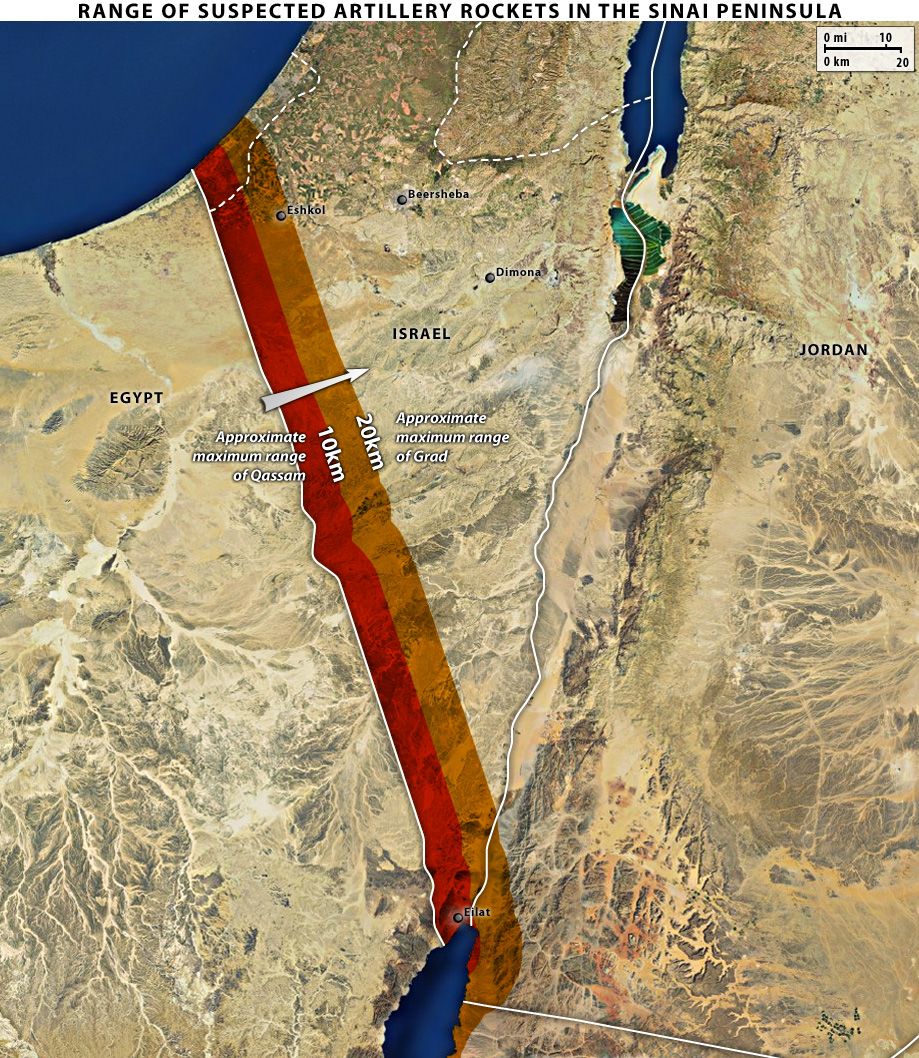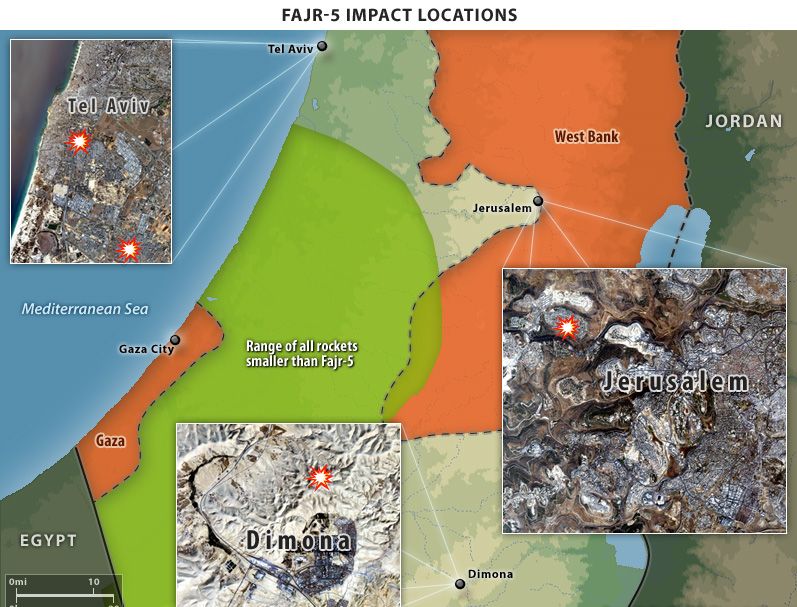A war has been under way for several months, with Hamas launching Qassam rockets into Israeli
territory and Israeli aircraft carrying out raids on Gaza. In point of fact, a
war has been ongoing between various Palestinian entities and Israeli
organizations since before the founding of the Israeli state.
During the previous most major flare up we already covered Israel and Palestine here:
However this conflict in Gaza comes at an interesting time in
Egyptian-Israeli relations. Cairo recently saw the Muslim Brotherhood candidate
assume the Egyptian presidency, while in the past two years Israel has approved
two Egyptian military increases in the Sinai Peninsula above levels set in the
Camp David Accords. The disposition of the forces in Sinai coupled with the
presence of the Multinational Force and Observers mean at present, Egyptian
forces do not pose a significant threat to Israel. How Egypt will respond to
the conflict between Israel and Hamas in the Gaza Strip remains to be seen, but
should the Morsi government or Egypt's military decide to support Gaza, such
support would likely consist of turning a blind eye toward militant activities and
smuggling in the Sinai Peninsula.
Hamas has tried to emulate the success of the Muslim Brotherhood in
Egypt, and in the process the group has eased off its militant operations in
favor of establishing its political credentials. But Hamas' attempts at
legitimacy have galvanized more radical elements of the group into rebelling
and forming new militant groups to take up arms against Israel.
The most notable of Hamas' rivals are the Salafi-jihadists. Composed of
former Hamas members and former members of the Palestinian Popular Resistance
Committees, these individuals claim to have ties to al Qaeda. The
Salafi-jihadists differ from Hamas in terms of ideology: Whereas Hamas is
trying to build a style of governance akin to the Muslim Brotherhood's in
Egypt, the Salafi-jihadists want to establish an Islamic caliphate.
Many of these groups are still operating today, most with a focus on
attacking Israel. Others, such as Jaish al-Islam, have expanded their attacks
in the Sinai Peninsula and Egypt against Israeli and Christian targets.
Facilitating this expansion was the post-Mubarak security vacuum and the spread
of Salafism from Egypt into Gaza. Most groups possess weapons, munitions,
willing militant fighters, and some possess short-range rockets capable of
striking Israel.
Despite this weaponry, there are several reasons these groups cannot
surpass Hamas. First, there is a degree of competition among these groups. In
some cases, rivalries stem from clan membership. Second, these groups are
deliberately diffused. A large and unified group would be targeted by Hamas.
Third, these groups have inferior access to resources. Hamas largely controls
shipments passing in and out of Gaza and has more manpower and access to
financial and military resources. Fourth, these groups are unable to prevent
Hamas from entering their territory even though they enjoy varying levels of
local support. Last, Hamas is more institutionalized than these groups. It
boasts wider popular support in large part because it provides public services
to the people of Gaza.
With Hamas embroiled in the current conflict with Israel,
Salafi-jihadists can be expected to try to prolong the conflict by continuing
attacks against Israel. A prolonged conflict would allow the Salafi-jihadists
the opportunity to intensify and expand their operations geographically without
the oversight of Hamas. These groups will likely attempt to solidify and grow
their influence in their respective neighborhoods and networks, and they may
even attempt more attacks in the Sinai Peninsula -- efforts that are typically
hampered by Hamas.
However, Israel is fully aware of the Salafi-jihadists' intentions. The
Israeli military will attempt to weaken but not destroy Hamas in the ongoing
conflict, as evidenced by its airstrikes against rocket locations and targets
affiliated with the militant wing of Hamas, rather than the political
wing.
Israel knows that without Hamas, Gaza would likely spiral into chaos
with several different militant fronts operating without restraint. Further
destabilization would likely require Israel to reoccupy Gaza -- a daunting task
that would require more resources and manpower than dealing with a
Hamas-controlled Gaza.

And what is the importance for
the rest of the world?
As the United States withdraws from the region and Iran suffers a
significant reversal in Syria as is to be expected soon, the fate of the region
becomes less significant. Whether the Israelis and Palestinians fought mattered
in 1970 far more than it does today.
This is the reality of the current round of the Palestinian-Israeli war.
It matters to the Palestinians and Israelis but not to the world, beyond those
who demand a world that is just and whose definition of justice is what they
believe to be just. Where the world once hung on the wars of the region, it now
sees this as simply another upswing in an ongoing and unending conflict.
The Egyptians remain heavily influenced by the military and the military
is not about to allow Gaza's problems to spill into Egypt. The Syrians are busy
fighting each other and the Jordanian regime has never forgiven the
Palestinians for their attempt to end Hashemite rule in 1970. The Iranians are
struggling to hold their position in the region, and the United States under
U.S. President Barack Obama is not focused on foreign policy, let alone on
another Israeli-Palestinian battle.
Today, no one but the combatants and their unarmed champions care. This,
however, makes it a notable point in history. It is the moment at which both
sides might realize that they are on their own and, therefore, become
interested in peace. But with thoughts like that we might want to pass around a
petition, fantasizing that a petition constitutes action. But indifference from
the world is a harsh sort of reality.
The result is an Israeli military campaign in Gaza that places Hamas'
credibility in question and could create more space for a group like the
Palestinian Islamic Jihad, which has close ties to Iran. The conflict will also
likely create tension in Hamas' relationship with the Muslim Brotherhood in
Egypt, Jordan and Syria, since the Brotherhood, particularly in Egypt, is not
prepared or willing to confront Israel beyond rhetoric and does not want to
face the public backlash for not doing enough to defend the Palestinians from
Israel Defense Forces.
Tomorrow
we continue by exposing the Iranian connection in all of this.

For updates click homepage
here